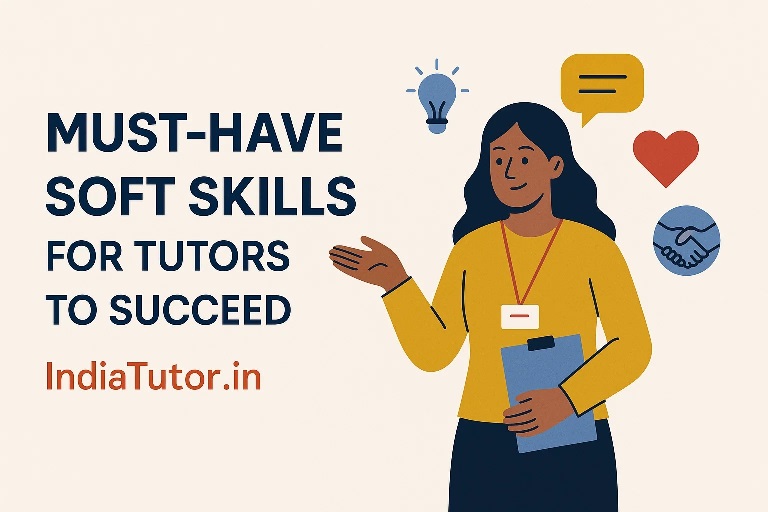When people think about becoming a tutor, they often focus on subject knowledge or teaching qualifications. While these are important, there’s another side of tutoring that plays a bigger role than most realize — soft skills.
Soft skills are the personal attributes that help you communicate, connect, and work well with others. In tutoring, these skills are essential for creating an engaging learning experience, building trust with students and parents, and managing classes effectively.
Let’s explore the must-have soft skills every tutor should develop to succeed in today’s competitive and ever-changing education landscape.
1. Communication Skills
A tutor’s ability to explain concepts clearly can make or break a student’s understanding. Communication is not just about speaking; it’s also about listening.
Tutors who listen actively can better understand a student’s struggles and adjust their teaching style accordingly. A 2023 study by the Education Development Trust found that students who felt heard and understood by their tutors showed 32% higher improvement in academic scores than those who didn’t.
Whether you’re teaching in person or online, clear and encouraging communication is key to making students feel comfortable and motivated.
2. Patience
Every student learns at a different pace. What may take one child 10 minutes to grasp might take another three classes. Patience is what allows tutors to keep trying different methods until a student finally gets it.
Without patience, a tutor may rush or show frustration, which can discourage students. Good tutors know that learning is a process and stay calm even when progress is slow.
3. Adaptability
No two students are the same. Some are visual learners, others need verbal explanations or real-life examples. Adaptability means being able to switch your teaching approach based on the student’s needs.
In today’s digital world, tutors also need to adapt to new platforms, apps, and teaching tools. According to a 2024 report by EdTech India, over 70% of students now prefer hybrid learning models, which require tutors to be comfortable both online and offline.
Adaptable tutors stay relevant, flexible, and in demand.
4. Empathy
Empathy helps tutors build a stronger connection with their students. When a student is struggling with a concept, facing personal issues, or just having a bad day, a little understanding goes a long way.
Students are more likely to open up and share their challenges with tutors who show genuine care. This builds trust, which is often the first step toward real learning.
5. Time Management
Many tutors handle multiple students, prepare lessons, check assignments, and follow up with parents. Without proper time management, this can quickly become overwhelming.
Good tutors plan lessons in advance, track student progress, and manage their schedules efficiently. Using planners or simple tools like Google Calendar or Trello can help keep things organized.
Being punctual and respecting the student’s time also creates a sense of discipline and professionalism.
6. Confidence
Students pick up on a tutor’s confidence. If you’re unsure while teaching, students may also start doubting the material. Confidence doesn’t mean knowing everything; it means being honest when you don’t and showing the willingness to find the answer.
Confident tutors inspire students to ask questions, make mistakes, and keep trying — all essential parts of learning.
7. Problem-Solving Ability
Every tutoring session is different. A student may forget what was taught last week, or a video call might drop during a crucial explanation. Tutors who can stay calm and find quick solutions stand out.
Problem-solving skills also help when dealing with tough situations like uncooperative students or sudden curriculum changes.
8. Positive Attitude
A positive attitude can lift a student’s mood and create a more enjoyable learning experience. Tutors who stay optimistic, even during challenges, encourage students to do the same.
Studies show that positive reinforcement increases student engagement by up to 40%, especially in primary and middle school students.
A smile, a word of encouragement, or a small celebration of progress can make a big difference.
My Thoughts
Being a successful tutor in today’s world requires more than just academic expertise. Soft skills like communication, empathy, and adaptability help tutors build meaningful relationships, deliver effective lessons, and inspire lifelong learning.
If you’re a tutor or planning to become one, take time to work on these soft skills. Read, observe, practice, and keep improving. At IndiaTutor.in, we believe that great tutors not only teach — they connect, uplift, and empower.
And that begins with mastering the art of human connection.
By Nidhi Mehta – Founder, IndiaTutor.in
🔥 Post Engagement
👁️ 14 Total Views
🔥 1 Views Today
📈 14 Views Last 7 Days
Share:
WhatsApp | Facebook | Twitter | LinkedIn
To share your Feedback or Review – Contact Us
Are you a Tutor? Register your Tutor profile on India Tutor to connect with Students in India and Abroad.
Are you a Parent or Student? – Submit Tutor Wanted Form to reach relevant tutors registered on IndiaTutor.in.
Do you own a Tuition Center? Want to connect with students in your local area? List your center with us.
Free Online Self Evaluation Tests for Tutors and Students
Read our Reviews Have Questions? Read FAQs

